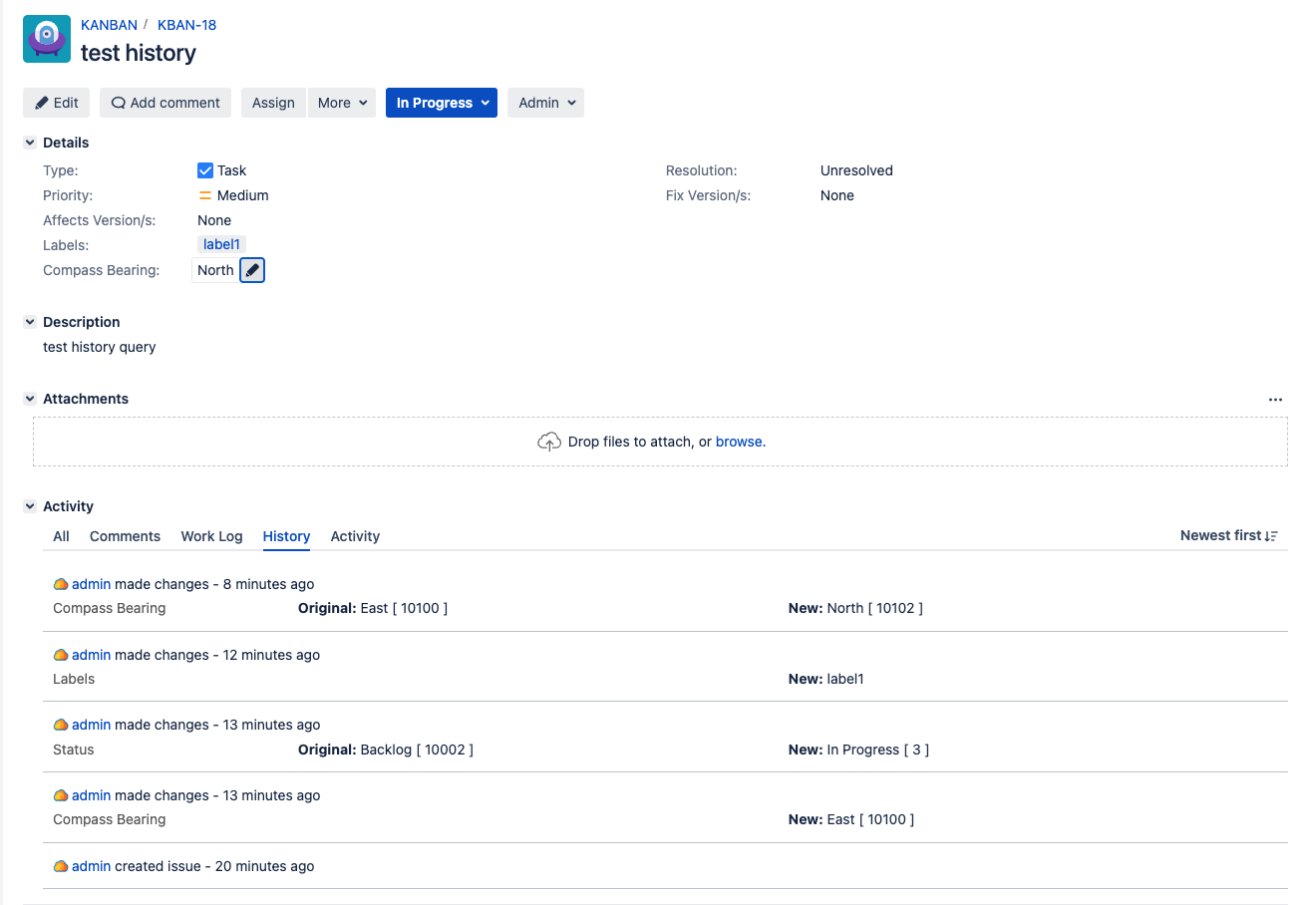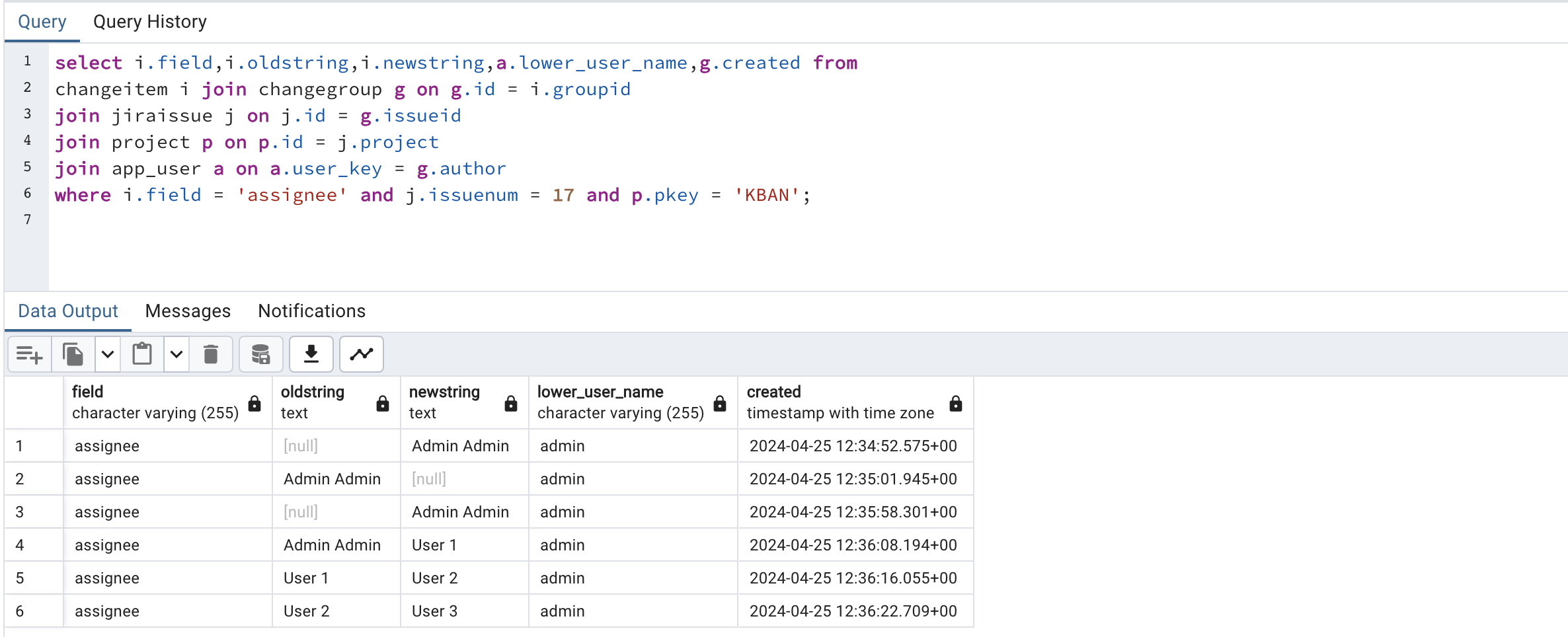How to retrieve issue change history from database in Jira
Platform Notice: Server, Data Center, and Cloud By Request - This article was written for the Atlassian server and data center platforms but may also be useful for Atlassian Cloud customers. If completing instructions in this article would help you, please contact Atlassian Support and mention it.
Support for Server* products ended on February 15th 2024. If you are running a Server product, you can visit the Atlassian Server end of support announcement to review your migration options.
*Except Fisheye and Crucible
The information on this page relates to accessing the Jira database. Consequently, Atlassian Support cannot guarantee the provision of any support for the steps described on this page, as we do not recommend direct access into the database. Please be aware that this material is provided for your information only and that you use it at your own risk.
Purpose of this article
The purpose of this article is provide SQL queries to retrieve from the Database the updates made to a Jira issue.
Environment
- Jira Server/Data Center on any version from 8.0.0.
- These SQL queries have been tested only on PostgreSQL 9.3, PostgreSQL 12, and MySQL 5.7. They may require modifications to run for other database types and versions.
Solution
Execute the following SQL queries to get the issue change history for one Jira Issue:
- To retrieve the change history for an issue (including status, transitions, change in values, etc):
This query can be used to confirm that the dates and order of changes are the same in the source and target Jira instances.
All changesSELECT p.pname, p.pkey, i.issuenum, cg.ID, cg.issueid, au.lower_user_name, cg.AUTHOR, cg.CREATED, ci.FIELDTYPE, ci.FIELD, ci.OLDVALUE, ci.OLDSTRING, ci.NEWVALUE, ci.NEWSTRING FROM changegroup cg inner join jiraissue i on cg.issueid = i.id inner join project p on i.project = p.id inner join changeitem ci on ci.groupid = cg.id inner join app_user au on cg.author = au.user_key WHERE p.pkey = '<Project Key>' and i.issuenum in (<Issue Number>) order by 1,3,4;
To get only STATUS changes:
Status changesSELECT p.pname, p.pkey, i.issuenum, cg.ID, cg.issueid, au.lower_user_name, cg.AUTHOR, cg.CREATED, ci.FIELDTYPE, ci.FIELD, ci.OLDVALUE, ci.OLDSTRING, ci.NEWVALUE, ci.NEWSTRING FROM changegroup cg inner join jiraissue i on cg.issueid = i.id inner join project p on i.project = p.id inner join changeitem ci on ci.groupid = cg.id AND ci.FIELDTYPE='jira' AND ci.FIELD='status' inner join app_user au on cg.author = au.user_key WHERE cg.issueid=(select id from jiraissue where issuenum = <Issue Number> and project in (select id from project where pkey = '<Project key>')) order by 1,3,4;To get one Custom Field changes:
Custom field value changesSELECT p.pname, p.pkey, i.issuenum, cg.ID, cg.issueid, au.lower_user_name, cg.AUTHOR, cg.CREATED, ci.FIELDTYPE, ci.FIELD, ci.OLDVALUE, ci.OLDSTRING, ci.NEWVALUE, ci.NEWSTRING FROM changegroup cg inner join jiraissue i on cg.issueid = i.id inner join project p on i.project = p.id inner join changeitem ci on ci.groupid = cg.id AND ci.FIELDTYPE='custom' AND ci.FIELD='<Custom Field Name>' inner join app_user au on cg.author = au.user_key WHERE cg.issueid IN (select id from jiraissue where issuenum = <Issue Number> and project in (select id from project where pkey = '<Project key>')) order by 1,3,4;To get the assignee changes for a specific issue:
Assignee changes for a specific issueselect i.field,i.oldstring,i.newstring,a.lower_user_name,g.created from changeitem i join changegroup g on g.id = i.groupid join jiraissue j on j.id = g.issueid join project p on p.id = j.project join app_user a on a.user_key = g.author where i.field = 'assignee' and j.issuenum = <Issue Number> and p.pkey = '<Project key>';
In the above queries
- replace <Issue Number> with Issue's number
- replace <Project Key> with Issue's project key
- replace <Custom Field Name> with the custom field name
Examples
Using Jira Issue KBAN-18
- <Issue Number> = 18
- <Project Key> = KBAN
Query all changes
Query Status changes
Query custom field 'Compass Bearing' changes
Query assignee changes
Using Jira Issue KBAN-17
- <Issue Number> = 17
- <Project Key> = KBAN





